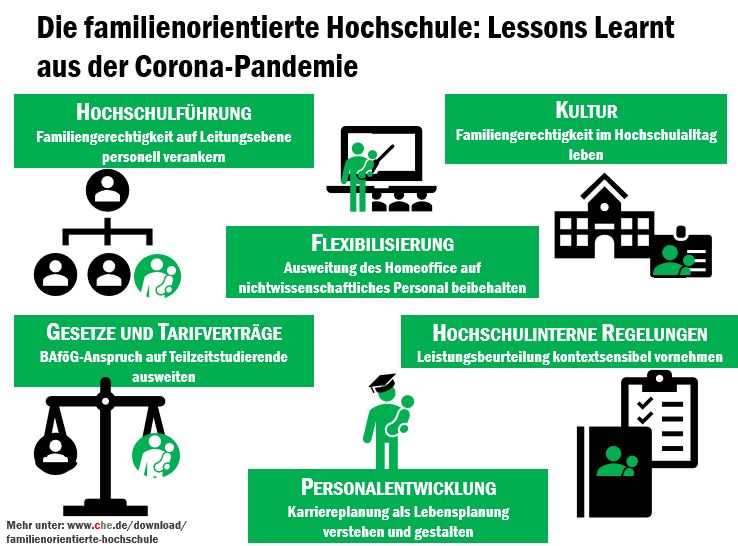 Foto: congerdesign / Pixabay
Foto: congerdesign / PixabayThe impact of the coronavirus pandemic poses major challenges for university staff and students with family responsibilities. A recent publication by the CHE Centre for Higher Education reveals which measures for balancing work, study and family life have worked well so far in the current crisis. In partnership with the “Familie in der Hochschule” association, CHE consequently calls for issues such as family-friendliness to become firmly and permanently entrenched at top-management level.
Many higher education institutions (HEIs) in Germany have recognised the need for family-friendly policies. Around seven per cent of all students have one or more children. But not only that – staff on campus, whether engaged in university management, research, teaching or administration, also have family responsibilities. A recent study from 2020 shows that around half of the technical and administrative staff surveyed at the University of Potsdam, for example, have children, and that six per cent have the responsibility of caring for relatives. Nine out of ten employees with family care responsibilities said that they were more stressed, or much more stressed, during the COVID-19 pandemic. Among the group of teaching staff at the University of Potsdam, 44 per cent also have children.
“The current pandemic situation reveals the pressures faced by a large number of staff and students at our HEIs. Women still do the majority of care work. And the closure of day care centres and schools, for example, has meant that women are reaching the end of their tether,” explained Sarah Wenz from the Management Board of “Familie in der Hochschule e.V.” “What we need are more family-friendly practices, as well as fast, effective, but also long-term measures to relieve the burden on female university staff in particular. Otherwise they may be disadvantaged and find that their careers are at risk,” stated Wenz, Head of the Equal Opportunities Office at Karlsruhe Institute of Technology.
The current pandemic situation prompted the “Familie in der Hochschule” association to team up with CHE in a bid to put family-friendly practices at HEIs to the test and to identify suggestions for improvement. To this end, the authors of the study surveyed family offices at HEIs in Germany in summer 2020. The survey focused on family-friendly structures that worked particularly well at HEIs during the pandemic and on new structures developed in response to the crisis.

Interestingly, HEIs where family-friendliness was already an integral part of the university’s structure were one step ahead of their less family-oriented counterparts during the Coronavirus pandemic. This meant not only the existence of dedicated support services and family offices, but also placing the issue of family-friendly policies at the heart of the management team, e.g. in the role of a vice president. Such HEIs found it easier to create new support tools ad hoc or to extend existing measures, such as working from home.
“HEIs where the issue of family-friendly practices was already a top priority before the coronavirus pandemic struck prevailed over others, and gained valuable time,” stated Frank Ziegele, describing the quintessence of the study. The Executive Director of CHE called for the topic to be fully embraced by management at all HEIs, also after the crisis, in order to step up family-friendly developments on campus. “Every time a child appears on a work-from-home parent’s video call, the daily balancing act between work and family responsibilities is visible to all participants. This is why the time is right to ensure that long-term consideration is given to the aspect of family-friendly policies on every campus,” asserted Ziegele.
The pandemic has also shown that much greater flexibility is possible in university administration than was previously assumed. In light of the study results, the earlier assumption that administrative staff, unlike their academic counterparts, must be present in the office seems outdated. There may be certain activities in both areas that can be done better on campus, but working from home is also possible in both fields of work. Shifting work to the home environment holds great potential for freeing up time, making everyday family life just that bit easier. The option should therefore be equally available to all employees, wherever feasible.
Career and staff development is an area in which shortcomings and development needs were particularly exposed during the pandemic. For example, the disadvantage suffered by female professors and early career researchers became particularly apparent during the pandemic, owing to them carrying the double burden of work and care, i.e. nursing or childcare, throughout much of the crisis.
“The coronavirus pandemic has clearly shown that it is a tremendous logistical exercise for scholars, whether male or female, to juggle family responsibilities with publishing their research,” stated Frank Ziegele. “Care responsibilities and committee work should therefore be rewarded in appointment and recruitment procedures, as is already being discussed at some HEIs for the area of performance assessment,” the CHE Executive Director urged.
About the study:
The study is based on a survey of family officers at six HEIs in Germany and one Austrian university in the period from June to September 2020. All of the HEIs surveyed are members of the “Familie in der Hochschule” network. The “Familie in der Hochschule” charter was published in January 2014. As a strategy development towards permanent equal opportunities and family-friendly policies in academia, the charter is supported by the CHE Centre for Higher Education, which, as a science organisation, is also committed to the goals of the charter. The analysis “Der Weg zur familienorientierten Hochschule – Lessons Learnt aus der Corona-Pandemie” (The path towards being a family-friendly university: lessons learnt from the COVID-19 pandemic) was written by Lisa Mordhorst, Caroline Friedhoff, Nina Horstmann and Frank Ziegele.
